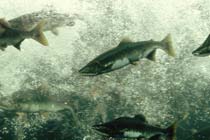GE salmon and I-522 updates
This article was originally published in April 2013
Reject GE salmon
If you haven’t already, please submit a comment to the Food and Drug Administration (FDA) asking it to reject approval of genetically engineered salmon.

FDA already has recommended approving genetically engineered (GE) salmon as a “new animal drug,” meaning it was subjected to a less rigorous safety review than if it was a food additive. There is no data on two identified potential hazards: the added growth hormones and an insulin-like hormone called IGF-1, linked to a number of cancers. There’s no data because only inappropriately insensitive tests were used to try and detect them.
FDA is moving forward with approval based on tests for allergens with only six genetically engineered fish. Even this limited testing showed an increase in allergy-causing potential. Studies also show GE salmon have lower levels of omega-3 fatty acids — the “good” fat that makes salmon a healthy food.
For more information, visit Tell FDA not to approve GE salmon!. Submit your own comment to the FDA.
I-522 on the ballot
Washington’s initiative to label genetically engineered foods, I-522, has been certified by the state to appear on the November 5 ballot.
I-522 would require labels on GE salmon, just like a labeling law in Alaska already does. Alaska passed the nation’s first GE food labeling law back in 2005. Passed unanimously by the Alaska House and Senate and signed by the Governor, it was cited as a protective measure for the state’s commercial fishing industry.
I-522 also would protect freedom of choice for home gardeners by requiring labels on all GE seeds. Gardeners now have no way to know when they’re buying and planting GE sweet corn or squash seeds for their home gardens.
Other GE seeds and foods that would be labeled include sweet corn, corn chips, soy milk, canola oil, and soft drinks and candy made with genetically engineered corn syrup or engineered beet sugar.
